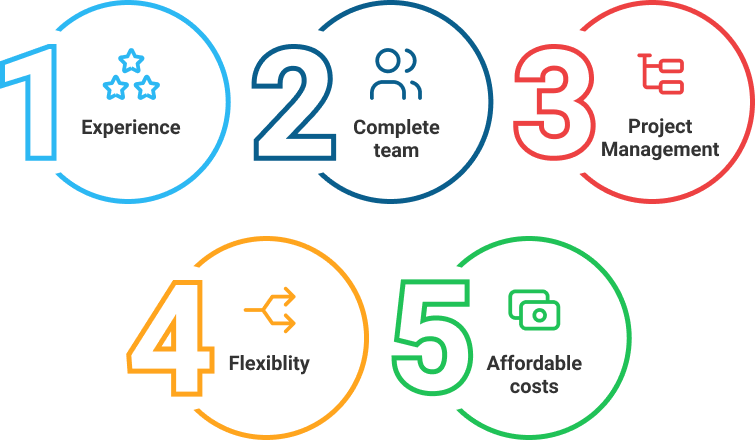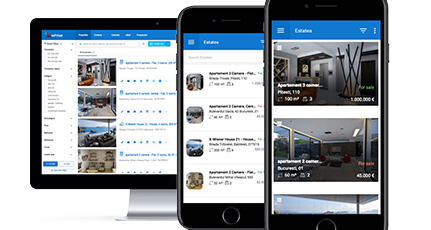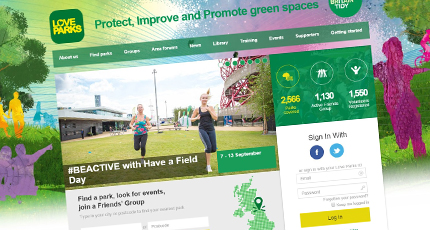
I’ll stand in your shoes today.
I’ll dare to intuit the questions on .NET you may ask, and then I will also provide all the answers to them.
I’ll spare you from the effort to scroll all over the article just to figure out what questions I have in mind.
Check out the following list to have a quick overview:
- “The optimal software development formula for…what?”
- “Is .NET the right choice for my projects?”
- “How large a .NET project team must be? And what if I don’t have enough developers?”
- “Hiring a dedicated team or extending the in-house one with new developers?”
- “What if I need to develop something specific? Very specific!”
- “What if the solution I must develop will integrate mostly sensitive data?”
Did I miss some? Write to me on this page, and I’ll get back to you as soon as possible with answers crafted on your needs and expectations.
“The optimal software development formula for…what?”
If the second part of the title intrigued you, most probably your question is “The optimal software development formula for…what?”.
…The optimal software development formula for getting high-quality solutions at affordable prices.’Cause this is a real thing!
And, the following things must be part of your formula:
- experienced .NET team able to understand fast the project’s requests;
- affordable developers with relevant experience on .NET projects;
- previous experience on similar .NET projects;
- flawless development process;
- high flexibility for adapting fast to changes/dynamic objectives;
- developing the solution in a reasonable time;
- as less reworks as possible;
- error-free final solution;
- affordable costs.

“Is .NET the right choice for my projects?”
Being on the market for over 2 decades, .NET remains the top framework used in development projects. I’m not saying that. A Statista report from 2021 proves this by numbers (Most used libraries and frameworks among developers, worldwide, as of 2021):

Why do developers prefer .NET?
Here are some reasons:
- high-functioning framework (several features);
- allows several types of developments – from full-custom solutions to cross-platform ones;
- doable for different types of interfaces (iOS, Android, Windows);
- supports 44 languages & offers easy deployment;
- security + compatibility + reliability + scalability
What can you build with .NET?
- Web applications;
- Mobile applications;
- IoT development;
- Big Data;
- AI applications;
- Cross-platform apps.
If you want to see some projects developed by our teams, check out our .NETportfolio to access our case studies.
“How large must a .NET project team be? And what if I don’t have enough developers?”
As you may expect, my answer starts with “depends”.
The .NET team size depends mostly on:
- project’s size and complexity level;
- project’s customizations level;
- ongoing developments (e.g., developing new features);
- developers’ expertise’s level.
Let’s take 3 examples from our portfolio:
Small-sized .NET team
The projects: Chatbot development for nGAGE HR platform
The context: Our client was crossing a reorganization process. During that period, the communication was significantly hampered, so the client was looking for a dynamic and easy-to-use tool able to complete the existing communication module (also developed with our teams). He had neither the time nor the knowledge of what type of tool is needed nor how it should look, asking for our support (from consultancy sessions to solution proposal and implementation).

Mid-sized .NET team
The projects: WHISE CRM – software development based on dedicated team model
The context:Our client’s core goal was to extend its leading position on other European markets through a flexible and modern solution, able to respond to real estate agents’/companies’ specific needs and expectations. Our collaboration with this client started in 2004 when we developed the first version of Customer Relationship Management software (WHISE CRM) – making it our longest-standing partnership.
The team:

Large-sized .NET team
The projects:Tour operator management system
The context:Tourpaq needed an up-to-date Tour Operator Management System that would enable the users to manage everything that has to do with their activity from a single dashboard. We implemented the following features: pricing, offers, availability, online sales, invoicing, due payments, real-time reports, data visualizations, price control automation, marketing, and integration with multiple third-party systems, such as GDS systems, insurance companies or SMS and email systems. The client also requested us to build for him Tourpaq Destination App (a modern solution for guides and tourists) and Tourpaq Guest App (an app that enables end-users to enjoy their holiday).
The team:

Having in-house developers with the right skills and experience for a project – that\s what I call having a lucky strike in software development.
But what are the odds?
So, if you don’t have the resources to start your .NET project and don’t know which is the right solution,
the next section from this article will (most probably) solve your dilemma.
“Hiring a dedicated team or extending the in-house one with new developers?”
What are the costs generated by extending your internal teams (In-house Staff)
Hiring process:

Equipment and training costs:

Ongoing payments:

Other costs:
Hidden costs generated by new hires:
- acclimating period to the work environment (team, methodologies, etc.) – During the accommodation period, the employees are not productive, initially generating only costs. As research showed (source: sloanreview.mit.edu) it will take 8 to 26 weeks for an employee to achieve full productivity;
- adaptation to projects requirement – If they don’t have experience in working on similar projects, new hires will generate extra-cost for more training. As research confirmed, due to the learning curve, new hires end up costing between 1% to 2.5% of total revenues. (source: MIT Sloan Review);
- employees leave the company until generating any profit – In IT companies the fluctuation of employees is dynamic as a result of the high demands on the market for specialists;
- retaining key-employees – Every project development relies on some key-employees. Keeping them satisfied takes energy, time and…money. Bonuses and salary increases are the most commonly used methods to retain performant employees in the company;
- employees become unavailable – Personal events like pregnancy, accidents or long term illness may keep them on pause for a significant period of time, blocking a position in your team and forcing you to restart the recruitment process;
- once the project is over, they become unproductive – Hiring people for a specific project comes together with the risk of taking on expenses for a period when they might not producing anything.
What are the costs generated by working with a dedicated team? (Software outsourcing)
The Dedicated Team Model is based on bringing together business analysis, project management, and skilled external employees’ absorption. By taking over an entire project, a dedicated team will cover all the needs and risks that can occur: setups operations to project management and the team’s architecture and functionality.
Services covered by a Dedicated Team (for software outsourcing):
- high-level management
- project management
- task management
- activities and processes supervision
- project stages and workflow development
- team architecture
- logistic management
- recruiting/selecting/integrating professionals in the project team
The dedicated team pricing system is simple and allows easy estimation. Based on an hourly rate, the client pays monthly bills according to the team size and structure.
Main costs a client has to take into account for working with dedicated team are:
- Hourly rate according to the team structure
- Travel expenses (if applicable)
- Management & communication for the project
Costs like…
- professionals’ salaries
- associated hiring taxes
- logistic investments
- benefits, taxes
- recruiting investments
…are supported by the company that provides the dedicated team.
“What if I need to develop something specific? Very specific!”
This is the requirement we receive most often.
Custom development involves a lot of experience and skilled developers.
And also involves a stable team –
able to extend, update and optimize the solution as needed.
This is the case for the Tourpaq project.
One of our long-lasting clients is Tourpaq ApS, a Danish company that provides software solutions for tour operators.
Before starting to work with us, we had several meetings that created the right context for both sides to present their approaches. Being able to understand their specific problems and coming up with practical solutions for each issue convinced the client that we are the right fit for his company.

“Since the beginning of our collaboration, we’ve entrusted Roweb with all project management responsibilities, leaving it to them to put into practice our ideas and input, which has enabled us to focus on selling the product and therefore achieve a huge competitive head start.”

Bjarke Hansen CEO
Owner TourPaq ApS
Their requirements came from a practical perspective. Our tasks were to provide them with consultancy in mapping out the exact specifications for the project, based on their concrete needs, to identify the best solutions, to address them, and implement these solutions.
(Find out more about Tourpaq project from the article How hiring a dedicated team impacted Tourpaq’s project development (the story behind the project)
“What if the solution I must develop will integrate mostly sensitive data?”
As I mentioned at the beginning of this article, in terms of security, compatibility, reliability and scalability .NET is always a good choice for developing your project.
Still, working with experienced .NET developers is mandatory.
That’s why companies like nGage, CIM Bank or FileLater chose our teams to develop their solutions.
A quick overview of these projects:
CIM Bank project
Our Client – CIM Bank is a leading Swiss Private Bank based in Geneva, Lugano and Wollerau that offers tailored services and uses innovative communication systems so the clients can have at their fingertips (literally and figuratively) the information they need.
Client’s needs – The client needed a new functional mobile app that is able to allow customers to:
- securely log into their accounts. (the client had an existing responsive website that the application would load after login);
- use the device biometric features to bypass the existing 2-factor authentication;
- interact with the existing website and use the mobile device’s built-in security features to authorize transactions;
- enrich the current website’s functionality with extended capabilities like Invoice payment through QR or document scanning.

Chatbot development for nGAGE HR platform
Client’s challenges – The client – nGage – used a dynamic platform (also developed by Roweb) to manage several HR activities (information for open positions, salaries, payments and invoices management, etc.). In addition, this solution integrates a communication module that our client’s employees use more often to exchange messages with the applicants. To increase responsiveness time and maintain a positive image in the market, the client decided to extend this communication module.
Client’s needs / goals
- improved communication between employees, employees – management, employees – applicants;
- faster access to relevant information;
- reduced phone calls numbers and transferring time-consuming tasks online;
- decreasing costs for internal and external processes.

We have what you need for developing your .NET projects. Take a look!
Custom-sized team for your project
The main aim of our dedicated teams is to work seamlessly as part of the client’s team to provide quality, unique and project-specific solutions. With more than 130 developers, we can offer you a complete team of experienced developers or a dedicated pool of developers with the appropriate technical capabilities for your particular needs.
.NET skills

Complete .NET services
- Custom ASP.NET web development
- App support and maintenance
- App migration from older systems to .NET CORE
- E-commerce development
- Data migrations and import/export
- WebServices development
- Business app development
- API integrations and solutions customization
- App integration with legacy systems
- App refactoring and optimizations




